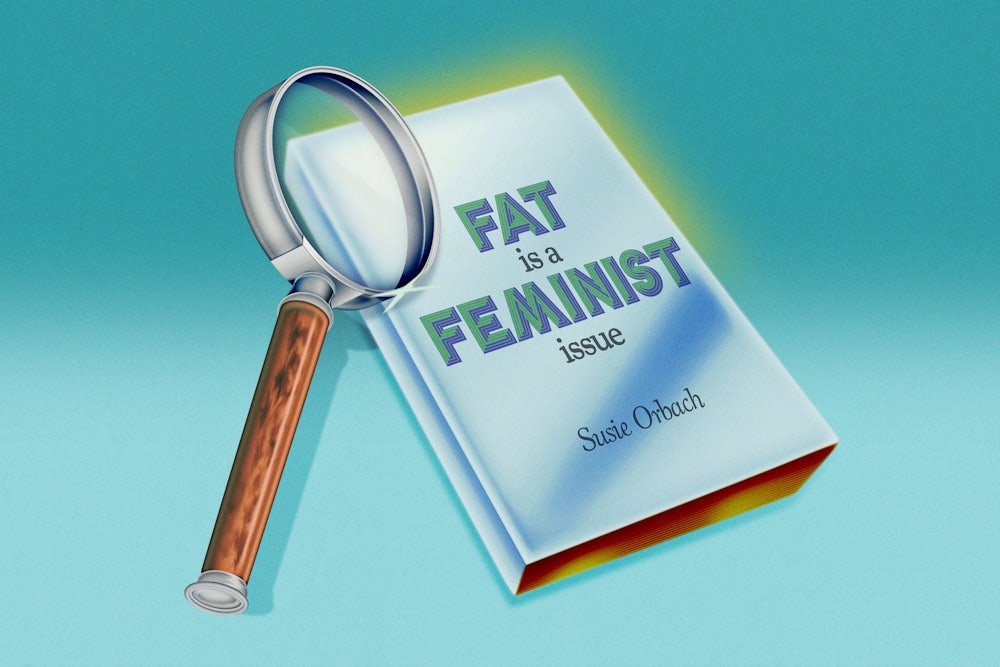The history of how women have endeavored to change, and usually shrink, the shape of our bodies is littered with artifacts so horrible they are often humorous: the massive, vibrating Magic Couch that promised 1950s husbands weight loss for their wives as a perfect holiday gift; the mail-order tapeworms that packaged parasites as a beauty product; the 1970s head-to-toe sauna sleeve meant to “melt” fat away; and the closets full of ThighMasters, Ab Rollers, and Butt Blasters that have since falsely promised to fix whatever “problem area” the era’s beauty standards dubbed in most urgent need of improvement or eradication.
The unabashed fixation on losing weight that drives demand for one such gimmick after another is what makes this assemblage so absurd, but the fact that this single-minded focus on slimming has survived for decades—through the fights for suffrage, reproductive rights, equal pay, and yes, even the body-positivity movement—feels like a gut punch to this twenty-first-century reader. Is aspiring to take up less space, and investing intensely to achieve it, actually inextricable from modern American womanhood?
When I first read Susie Orbach’s Fat Is a Feminist Issue as a graduate student in the early 2000s, I certainly didn’t think so. The book was published in 1978, the year I was born, and this confidence made me hate the bestseller that was called “shatteringly powerful” in offering the impossible—an “anti-diet guide to permanent weight loss”—in a characteristic review. Orbach’s title felt excitingly au courant, but her core argument struck me as only OK: that women are not fat due to their inherent weakness but rather because of a patriarchal society that makes food and their figures one of the few domains women (mostly) control. Compulsive overeating and its attendant weight gain make sense in this context as something other than a moral failure, whether as an act of resistance against dominant beauty and domestic expectations or as an equally desperate attempt to create a bodily armor to contend with the expanded demands of womanhood. On the one hand, fat could provide a literal defense against sexual violence; Orbach described the thickness of one woman’s thighs as creating a wall around her vagina. For others, the protection was more symbolic, as “the physical model of the shy, retiring flower, demurely smiling beneath lowered eyelashes, is too frail and insubstantial to accomplish the daily tasks of living that are their responsibility,” she explained in a decade in which more women filed for divorce and pursued advanced degrees than ever before. Her bottom line was to remind women that “at the point of giving up the fat you are not then throwing out all of yourself because you are more than the fat.” Weight loss as liberation.
The troubling part, in my eyes, was Orbach’s underlying assumption: that fatness is obviously bad, and an obstacle all psychologically healthy women should want to overcome. As Orbach explained, and appeared to accept as a rule of nature: “Fat women can’t win.” Framing girth as psychosocial pathology rather than personal failure might have been transgressive back in the 1970s—British Cosmopolitan called her argument a “controversial” new approach to a familiar “vicious cycle”—but to my early-aughts eyes, it just felt more like weight-loss propaganda sneakily trussed up as feminist liberation. How else could one interpret conclusions such as, “They feel safer using their mouths to feed themselves than using them and being assertive”? Or the confident assertion that only when a woman “risks going without food for a couple of hours until [she] experiences some hunger sensations” will she unlock self-knowledge and understand the nourishment she actually craves”? Perhaps most troubling to me was that Orbach, a prestigious feminist psychoanalyst, did not seem to be aware of, or even interested in grappling with, this tension. Fat Is a Feminist Issue, or “Fifi,” as Orbach now affectionately shortens the title, felt like a damning artifact of a less enlightened era when even eminent feminists couldn’t see past their own fat hatred, or even felt the need to mask it.
My unease, and even outrage, made sense at the height of the love-your-body/lifestyle-not-diet mood of the early-2000s wellness movement. Fat Is a Feminist Issue made no pretenses of loving or even accepting fat bodies as they are, but encouraged women to understand their size as the somatic manifestation of a social pathology. And feminist empowerment meant embracing this causal link and summoning the self-possession to shed the pounds that mostly symbolized subordination to patriarchy, or at least a self-destructive form of resistance to it.
In the age of Ozempic, Fat Is a Feminist Issue hits different, as the kids say. The absolutely voracious appetite in the United States for GLP-1s since their release in early 2023 has literally changed the economy of Denmark, where manufacturer Novo Nordisk is located. The drugs are officially available to those who are diagnosed with obesity or diabetes, but their off-label use for weight loss is off the charts for those who simply want to be thinner and can afford to pay handsomely for it. The cultural impact is hard to overstate: tabloids calling out ever more svelte celebrities for “Ozempic face,” gyms replacing cardio equipment with weight racks to address the muscle loss caused by the drugs, awkward acknowledgments of extreme weight loss for which there is no etiquette, and many who thought they were above scrutinizing other people’s bodies scrolling through social media whispering about whether this or that acquaintance did it “the old-fashioned way” or with our generation’s apparently magic pill. As it turns out, nearly a half-century after Fat Is a Feminist Issue and a quarter-century after I was so sure of the outdatedness of its underlying assumptions, women—more than half of GLP-1 users—are apparently as enthused as ever about losing weight as a way to unlock health and happiness.
So what can this text still offer us in this era that feels so different from the 1970s but, in its enthusiastic embrace of weight loss, so similar?
On the one hand, Fat Is a Feminist Issue is above all a fascinating and useful historical snapshot of a very different era in the history of diet and physical culture that vividly anticipates our own. Consider that Orbach had to push to even include “feminist” in the title; her skittish editors felt feminine was safer, a debate hard to imagine today. In wrapping weight loss in the idiom of feminist liberation and therapeutic self-improvement, Orbach was indeed making a radical contribution in the 1970s, but one that has by now morphed, in part, into the cynical dressing up of diet language in a discourse of self-care and empowerment.
When Orbach writes that “reappropriation of your power (temporarily given to fat) involves a reevaluation of yourself.… In owning the power of the fat, we can give it up,” I hear foreshadowing for shapewear commercials that promise “multihyphenate women” “confidence and support” and to ensure they “feel seen no matter what they are doing” or activewear that encourages women to “wear the damn shorts” but then invites consumers to click through to “bum-sculpting styles.” Notably, there is a pendulum swing afoot away from such euphemism to overt diet talk: Weight Watchers abandoned a brief rebrand that had elevated “wellness”; Airmail Weekly recently profiled a new “good old-fashioned weight loss program,” the sought-after “Sorority Nutritionist,” who advertises a sisterhood based on “empowering women to have fun while losing weight so they can live their hottest, healthiest, and happiest life.”
So too was Orbach writing in an era before talk of “the obesity epidemic” was inextricable from any discussion of weight, a development then in its infancy. Yet, in pathologizing weight gain as a clinical problem, albeit a psychological rather than a physiological one, Fat Is a Feminist Issue laid crucial groundwork for the medicalization of fatness today most associated with the obesity epidemic. The problem with this discourse, critics such as philosopher Kate Manne express, is that it gives clinical cover to fat discrimination, leaving little room to resist the idea that fatness is inherently a serious medical condition rather than simply how some bodies look. To both Orbach and the modern-day anti-obesity activists Manne critiques, such acceptance, or even celebration, is a dangerous capitulation to pathology. “Doubling down on the rhetoric of obesity-as-disease,” Manne wrote, has always “deemed fat people as deficient” and, in the Ozempic era, expands that lack to be “not of willpower, perhaps, but of a very special hormone.”
Orbach’s emphasis on the individual psychological pathology that gives rise to compulsive eating and excessive weight gain noticeably absents two other major issues that today are inextricable from such conversations: the role of food systems and of exercise. For Orbach, the problem is lack of control at the refrigerator, rather than the systems that determine what is on its shelves. Of one woman dealing with workplace sexism, she wrote, “When a more equitable work situation was arrived at, she found less need to cram her mouth furtively with candies.” By contrast, nutrition was mostly perceived, by her and the culture at large, as a matter of individual choice. Indeed, the fast food industry had not yet reached its peak and made caloric, processed food the most affordable option for many Americans. The “systemic” discussion of such issues was on the distant horizon, and most of Orbach’s subjects were middle-class women who exerted some degree of control over their shopping lists. Orbach’s formulation reflects the dominant idea, a hangover of the John F. Kennedy era, that fatness was the result of affluence—JFK had blamed a generation of “soft Americans” on excessive “push-button luxury” and leisure born of postwar prosperity.
Exercise was JFK’s fix for this unbridled American abundance, and he went further than his predecessor, Eisenhower, in encouraging movement and fitness not only for children who might be future soldiers but also for adults who craved longevity and “vigor.” Given that the Presidential Council on Fitness was a Cold War initiative centrally focused on developing soldiers, adult women were just about the last priority. Understandably, Orbach’s patients and intended readership might have been enrolled in a Kennedy-era physical fitness class as children, but they were just old enough that the passage of Title IX in 1972 would not have meaningfully transformed their relationship with exercise as it would for their daughters. Rather than feeling guilt that they should get moving with a jog or in the women’s exercise classes that were multiplying throughout the 1970s, they were more likely to dutifully leave their plate clean of food, since they had been raised with the refrain that filling their stomachs was the least they owed to the “starving children in Europe” and the brave soldiers who fought to liberate them in World War II.
Analyzing Fifi as a historical primary source is interesting, but if it establishes that fat is certainly a feminist issue, it evades the more complicated, key question of precisely how. Historical distance is helpful but not imperative to see the limitations of Orbach’s feminism. The fat liberation movement was in full swing at the time of Fifi’s publication, and these activists immediately called out a myopia in Orbach’s approach and the feminist movement more broadly. There was nothing inherently pathological or even unsightly about fat, the radical group the Fat Underground and its scholarly allies asserted: “Tired of being treated like second class citizens by their nonfat feminist sisters,” one member wrote of their activism in the late 1970s, “these radical fat feminists are creating a sisterhood where size is admired, celebrated and prized, where fatness equates with power, strength, and beauty.” Fat acceptance was the only path forward for this maligned group rejected even by feminists and desperate for change; their rallying cry was “Fat people of the world unite: You have nothing to lose!”
Fat liberation was radical, short-lived, and inimical to the dominant aesthetics of both 1970s and 1980s culture, even that shaped by feminism. Reedy flower girls in flowing dresses, sinewy athletes empowered by Title IX or their leotard-clad counterparts in aerobics studios, and corporate businesswomen in power suits exemplified a range of paths available to women, but no such latitude existed in terms of size. Yet both Orbach and the Fat Underground made an indelible, if for years mostly imperceptible, mark on how women are expected to relate to our bodies. By the early 2000s, “body positivity” was popping up everywhere, combining the therapeutic self-talk Orbach gave us with the idea that we should love our bodies exactly as they are, as the Fat Underground had insisted.
If fat women are no longer uncritically expected to want to change those bodies, as Orbach had implied, the range of the bigger bodies now regularly on display in store windows and magazine spreads is significantly narrower than what the Fat Underground had called for. And even those slightly larger mannequins, models, and social media influencers regularly elicit outcry as promoting supposedly unhealthy behavior. Furthermore, the differing stakes of embracing this one-size-fits-all imperative to love your body are undeniable, and undermine its value. A size-zero dancer’s claim that she loves her body is fundamentally different from the same declaration by a fat person whose girth is frequently understood to be the most striking aspect of her appearance.
And of course, the assumption that one should have an intense emotional relationship with one’s physical appearance went unquestioned. “Body neutrality” became the next paradigm to attempt to resolve this new pressure, but, while I’m a fan of this approach, did not prove tremendously inspiring and did not shift the culture as momentously as some hoped. These efforts and their accomplishments notwithstanding, there is little question that fatness still inspires a special kind of vitriol. One fat friend described open ridicule and discrimination against fat people as the last acceptable bastion of identity-based hatred. (And as Emma Copley Eisenberg has recently written for this magazine, “fatphobia” may be the literary world’s “least discussed form of hate, oppression, and discrimination.”)
Despite limited gains, a common, often whispered, question is whether I think “body-positivity gone too far.” The better question, I think, is what have feminists concerned with body image, like Orbach, bequeathed us? Eating and exercise disorders didn’t disappear, and new forms of body modification only multiply, from organ-crushing waist trainers to butt implants to all manner of facial injections, to the ubiquitous facial filters that subtly shift our expectations of “normal” appearance. Indeed, Orbach’s 2009 book Bodies continues her examination of weight loss, connecting it to labiaplasty, contouring, and face filters, thus revealing how totalizing is our worldview that bodily reinvention is the path to happiness, regardless of the violence it requires.
While researching this article, I was served a story about a woman who underwent a brutal limb-lengthening procedure that involved breaking her femurs and inserting them with metal rods, at the behest of a boyfriend who promised that in her new, leggy form, he would love her forever. They broke up, but she announced that despite eight years of intense pain, she is “happier than ever.” The message both echoes Orbach’s in Fifi and exemplifies what she now critiques: the unquestioned assumption that transforming one’s body, even brutally and in service of dominant beauty standards, can be an act of self-affirmation and respect.
A different sort of failure is more complex. A new, more subtle pressure to love your body, or at least mask your dissatisfaction with it, has emerged. Back in 2006, pathbreaking fat studies scholar Kathleen LeBesco worried her work would be taken less seriously after she lost nearly one hundred pounds. A sympathetic profile in the Chronicle of Higher Education recorded her condemnation of Weight Watchers, “weakness for Kentucky Fried Chicken and Ben and Jerry’s ice cream,” and recommendation to the reporter of “one of the heaviest noodle dishes on the menu,” as if to prove her imperviousness to weight loss pressures, and thus her credibility.
More tacitly, it’s not socially acceptable among certain circles of progressive women to admit one wants to lose weight, lest this be understood as self-hating “diet talk.” This pressure can be so palpable that on a recent trip to France, I heard women openly talk about wanting to lose 10 pounds and, somewhat perversely, felt almost jealous that these women hadn’t been socialized to understand that even if they felt this way, such sentiments were unspeakable. Women of my age, that is to say the age of Fat Is a Feminist Issue, who have embraced this distaste for diet talk but who now face postpartum or perimenopausal weight gain, and are often unhappy about it, find ourselves in a particular bind. Women in Orbach’s era paradoxically enjoyed a greater insouciance about voicing these insecurities, I realized, even if they were likely more preoccupied with weight and hamstrung by anti-fat discrimination than our generation is. Extreme examples of this dynamic, in which anti-diet influencers decry dieting and deny that weight gain is ever related to illness, and essentially end up as shills for ultraprocessed food companies, only make things muddier.
What can I say? Women and our vexed relationship to our weight and its correlation to our self-worth is a question we have far from figured out. Orbach, by not sugarcoating or shaming women for the deep-seated frustration many feel about being fat, while highlighting at least some causes for the intensity of their emotion, made a valuable contribution. In the Ozempic era, this drug’s apparent power to enable the miraculous, dramatic weight loss that the diet and fitness industries have long promised but failed to deliver illuminates how much that desire persists—despite the effort of fat activists. Beyond revealing how much the attitudes Orbach chronicled are still with us, it signals how much her advice, which sounded dated 20 years ago, is apt, even if not in quite the ways she imagined: “Expanding your definition of self to include other qualities in addition to the fat is crucial.”






